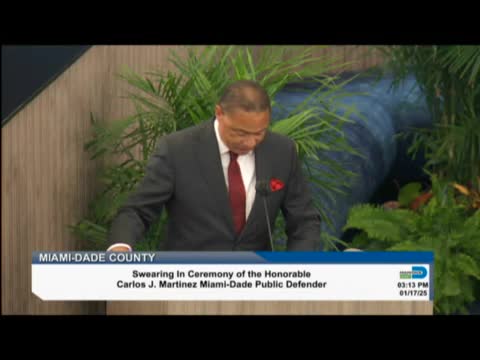Carlos Martinez sworn in for fifth term as Miami-Dade public defender; highlights mental‑health reforms and hiring push
Get AI-powered insights, summaries, and transcripts
Subscribe
Summary
Carlos J. Martinez was sworn in to begin a fifth consecutive term as Miami‑Dade public defender and used his remarks to announce near‑term priorities including expanded behavioral‑health responses, recruitment targets and regular interagency reviews of arrests tied to mental‑health crises.
Carlos J. Martinez was sworn in to begin a fifth consecutive term as Miami‑Dade public defender on a day of tributes, family remarks and program highlights, and used his oath ceremony to outline policy priorities for his office.
Martinez thanked colleagues and family and said he will press county and justice partners to change how the system handles people in mental‑health crisis. "I will be meeting with Kathy, and, with our chief judge and with our sheriff and, the president of the day chiefs soon, to have a discussion about having regular meetings where we are evaluating what's happened in the last month, 2 months with arrest, people who should not have been arrested, but instead should have been handled in a different way," Martinez said during his remarks.
The nut of Martinez's message was operational: reduce delays in treatment, expand front‑line mental‑health responses and continue recruiting and retaining attorneys. Alisa Quezada, a longtime colleague, said Martinez "doesn't just talk about making a difference. He acts," citing programs launched under his leadership including a behavioral health division, a partnership with Agape Network for employment training, and a children's‑defense initiative that Quezada described as "1 child, 1 attorney" supported by multidisciplinary teams.
Martinez and speakers described specific office efforts and near‑term targets. He said his hiring team aimed for 40 new hires for an August class by April 1 and that the office already had 34. He credited collaborations with State Attorney Catherine Fernandez Rundle on pay and retention work that Martinez said has been critical to keeping attorneys in Miami‑Dade. He also noted internal steps to modernize casework, including digitizing attorney files and video conferencing to communicate with detained clients.
On system evaluation and technology, Martinez highlighted a vendor partnership: "Thomson Reuters has co counsel, which is AI, and Thomson Reuters is working with us on coming up with solutions to be able to analyze, do batch analysis of thousands of arrest affidavits to be able to see where could something have been done differently," he said, adding that the office plans to pair that analysis with body‑worn camera review.
Chief Judge Nusian Safie, who administered the oath, framed the job in constitutional terms: "Your oath is to support, protect, and defend the Constitution, just like a judge's and just like a prosecutor's," she said. Martinez described the oath as a renewed obligation to clients and staff and thanked employees and leaders for work on retention, training and leadership development.
Several speakers recounted Martinez's tenure and programs. Quezada said a dedicated space in the office called "Gabby's Room" supports vocational training through a Project Victory partnership with Miami‑Dade Public Schools. Roy Barquette, a former assistant state attorney, recalled Martinez's courtroom work and long professional relationship with him; his remarks were personal and historical rather than policy prescriptions.
Martinez closed by stressing hope and institutional care for clients and staff: "I am more hopeful today than the 1st day that I took my oath of office, because I see the dedication of the people that I have in my office," he said. He emphasized ongoing work on mental‑health response, attorney pay and hiring, and creating more mobile crisis responses so law enforcement is not the default first responder to behavioral‑health crises.
The ceremony included formalities and tributes — judges, elected officials and bar leaders attended — but the substantive policy points were Martinez's commitments to interagency review of arrests, continuing salary and retention work with prosecutors and legislators, expanding behavioral‑health pathways for detained people, and continued investment in hiring and leadership development within the public defender's office.
